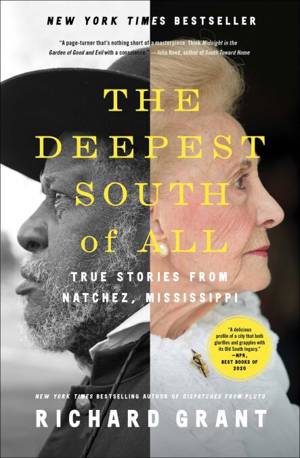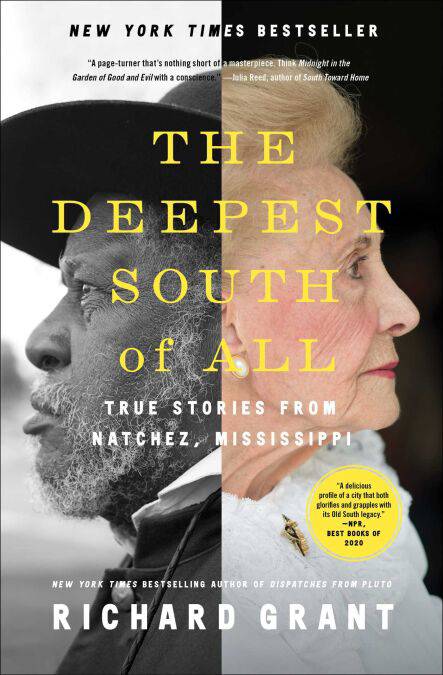
- Afhalen na 1 uur in een winkel met voorraad
- Gratis thuislevering in België vanaf € 30
- Ruim aanbod met 7 miljoen producten
- Afhalen na 1 uur in een winkel met voorraad
- Gratis thuislevering in België vanaf € 30
- Ruim aanbod met 7 miljoen producten
Zoeken
The Deepest South of All E-BOOK
True Stories from Natchez, Mississippi
Richard Grant
E-book | Engels
€ 15,65
+ 15 punten
Uitvoering
Omschrijving
Bestselling travel writer Richard Grant “sensitively probes the complex and troubled history of the oldest city on the Mississippi River through the eyes of a cast of eccentric and unexpected characters” (Newsweek).
Natchez, Mississippi, once had more millionaires per capita than anywhere else in America, and its wealth was built on slavery and cotton. Today it has the greatest concentration of antebellum mansions in the South, and a culture full of unexpected contradictions. Prominent white families dress up in hoopskirts and Confederate uniforms for ritual celebrations of the Old South, yet Natchez is also progressive enough to elect a gay black man for mayor with 91% of the vote.
Much as John Berendt did for Savannah in Midnight in the Garden of Good and Evil and the hit podcast S-Town did for Woodstock, Alabama, so Richard Grant does for Natchez in The Deepest South of All. With humor and insight, he depicts a strange, eccentric town with an unforgettable cast of characters. There’s Buzz Harper, a six-food-five gay antique dealer famous for swanning around in a mink coat with a uniformed manservant and a very short German bodybuilder. There’s Ginger Hyland, “The Lioness,” who owns 500 antique eyewash cups and decorates 168 Christmas trees with her jewelry collection. And there’s Nellie Jackson, a Cadillac-driving brothel madam who became an FBI informant about the KKK before being burned alive by one of her customers. Interwoven through these stories is the more somber and largely forgotten account of Abd al Rahman Ibrahima, a West African prince who was enslaved in Natchez and became a cause célèbre in the 1820s, eventually gaining his freedom and returning to Africa.
With an “easygoing manner” (Geoff Dyer, National Book Critics Circle Award–winning author of Otherwise Known as the Human Condition), this book offers a gripping portrait of a complex American place, as it struggles to break free from the past and confront the legacy of slavery.
Natchez, Mississippi, once had more millionaires per capita than anywhere else in America, and its wealth was built on slavery and cotton. Today it has the greatest concentration of antebellum mansions in the South, and a culture full of unexpected contradictions. Prominent white families dress up in hoopskirts and Confederate uniforms for ritual celebrations of the Old South, yet Natchez is also progressive enough to elect a gay black man for mayor with 91% of the vote.
Much as John Berendt did for Savannah in Midnight in the Garden of Good and Evil and the hit podcast S-Town did for Woodstock, Alabama, so Richard Grant does for Natchez in The Deepest South of All. With humor and insight, he depicts a strange, eccentric town with an unforgettable cast of characters. There’s Buzz Harper, a six-food-five gay antique dealer famous for swanning around in a mink coat with a uniformed manservant and a very short German bodybuilder. There’s Ginger Hyland, “The Lioness,” who owns 500 antique eyewash cups and decorates 168 Christmas trees with her jewelry collection. And there’s Nellie Jackson, a Cadillac-driving brothel madam who became an FBI informant about the KKK before being burned alive by one of her customers. Interwoven through these stories is the more somber and largely forgotten account of Abd al Rahman Ibrahima, a West African prince who was enslaved in Natchez and became a cause célèbre in the 1820s, eventually gaining his freedom and returning to Africa.
With an “easygoing manner” (Geoff Dyer, National Book Critics Circle Award–winning author of Otherwise Known as the Human Condition), this book offers a gripping portrait of a complex American place, as it struggles to break free from the past and confront the legacy of slavery.
Specificaties
Betrokkenen
- Auteur(s):
- Uitgeverij:
Inhoud
- Aantal bladzijden:
- 288
- Taal:
- Engels
Eigenschappen
- Productcode (EAN):
- 9781501177835
- Verschijningsdatum:
- 31/08/2020
- Uitvoering:
- E-book
- Beveiligd met:
- Adobe DRM
- Formaat:
- ePub

Alleen bij Standaard Boekhandel
+ 15 punten op je klantenkaart van Standaard Boekhandel
Beoordelingen
We publiceren alleen reviews die voldoen aan de voorwaarden voor reviews. Bekijk onze voorwaarden voor reviews.











